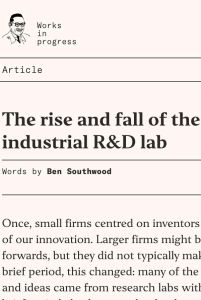Join getAbstract to access the summary!

Join getAbstract to access the summary!
Ben Southwood
The Rise and Fall of the Industrial R&D Lab
For a time in recent history, R&D labs seemed to exist in a golden age of innovation and productivity. But this period vanished as swiftly as it came to be. How did it happen, and why did it fade away?
Works in Progress, 2020
What's inside?
Today’s technology depends on yesterday’s R&D labs.
Recommendation
Although the business world seems thick with new technology, the pace of new discoveries has slowed since the post-war era when large industrial labs dominated innovation. In this densely detailed historic overview for Works in Progress, Ben Southwood reports that big labs declined in importance as smaller labs – and, later, immense new tech companies such as Google – came to dominate R&D. He examines the drivers that help today’s labs succeed and discusses their outlook for the future.
Summary
About the Author
Ben Southwood is the founding editor of the online magazine Works in Progress, a part of Stripe.

















Comment on this summary